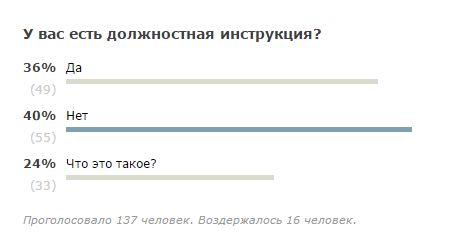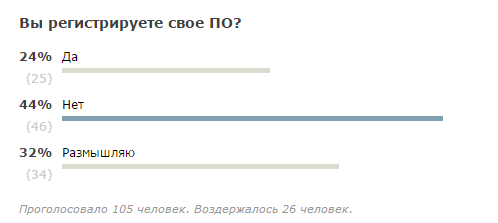Results of surveys on registration of rights in IT projects
For three months, we conducted surveys of Megamind users on various IT legal issues in their corporate blog. We hurry to share the results in the form of a kind of digest on the topic of compliance with legislation in IT projects.
Let's start with the material "The Truth About Your Rights To Software ." In it we told about the package of documents necessary for registration of rights to official works. The survey results below.

As you can see, only 9% of respondents consider the available evidence of software copyright to be sufficient, 55% are clearly sure of the opposite, and 36% are in doubt.
')
Taking into account that the audience of Megamind mainly consists of employees, not business owners, it is possible to come to a disappointing conclusion: in fact, about 10% of companies will be able to protect the rights to their own developments in court and most of the employees understand this.
The situation with the presence of job descriptions in the company is slightly better, as one of the required documents for registration of rights to official work. The survey was conducted in the article “ Why do job descriptions for developers? ".

As a result, 64% of respondents stated that such “formalities” were not observed at their place of work. That is, in most cases, employees formally legally develop software for themselves and they are still paid a salary for it.
Note that in commercial relations, respondents show great prudence. According to the results of the survey in the material “We prepare the correct technical task ” more than 80% reported on the execution of the TOR as an appendix to the software development contract.

It is possible that these results were affected by the fact that the majority of the respondents act as contractor and, accordingly, care not about securing their rights to the software, but receiving remuneration. And money not received in the moment is, as you know, a better motivator than risk and losing them in the distant future.
Although the relationship with remote workers and freelancers is not so simple. In the material "We conclude an employment contract for distance work " we conducted the following survey:

As you can see, more than half of the respondents say that there are no contracts with remote workers. What can I say about the copyright on the development?
In conclusion, we present statistics on software registration to the developer from the note “ Why register software? ".

Only a quarter of the respondents stated that they comply with externally necessary formalities for obtaining software certificates. Almost half of the respondents do not see this as necessary, and one third have not yet decided whether to protect their software even formally.
From the above results, it is possible to draw a disappointing conclusion about the state of legal rights of companies to their own and custom designs.
Let's start with the material "The Truth About Your Rights To Software ." In it we told about the package of documents necessary for registration of rights to official works. The survey results below.

As you can see, only 9% of respondents consider the available evidence of software copyright to be sufficient, 55% are clearly sure of the opposite, and 36% are in doubt.
')
Taking into account that the audience of Megamind mainly consists of employees, not business owners, it is possible to come to a disappointing conclusion: in fact, about 10% of companies will be able to protect the rights to their own developments in court and most of the employees understand this.
The situation with the presence of job descriptions in the company is slightly better, as one of the required documents for registration of rights to official work. The survey was conducted in the article “ Why do job descriptions for developers? ".

As a result, 64% of respondents stated that such “formalities” were not observed at their place of work. That is, in most cases, employees formally legally develop software for themselves and they are still paid a salary for it.
Note that in commercial relations, respondents show great prudence. According to the results of the survey in the material “We prepare the correct technical task ” more than 80% reported on the execution of the TOR as an appendix to the software development contract.

It is possible that these results were affected by the fact that the majority of the respondents act as contractor and, accordingly, care not about securing their rights to the software, but receiving remuneration. And money not received in the moment is, as you know, a better motivator than risk and losing them in the distant future.
Although the relationship with remote workers and freelancers is not so simple. In the material "We conclude an employment contract for distance work " we conducted the following survey:

As you can see, more than half of the respondents say that there are no contracts with remote workers. What can I say about the copyright on the development?
In conclusion, we present statistics on software registration to the developer from the note “ Why register software? ".

Only a quarter of the respondents stated that they comply with externally necessary formalities for obtaining software certificates. Almost half of the respondents do not see this as necessary, and one third have not yet decided whether to protect their software even formally.
From the above results, it is possible to draw a disappointing conclusion about the state of legal rights of companies to their own and custom designs.
Source: https://habr.com/ru/post/292962/
All Articles